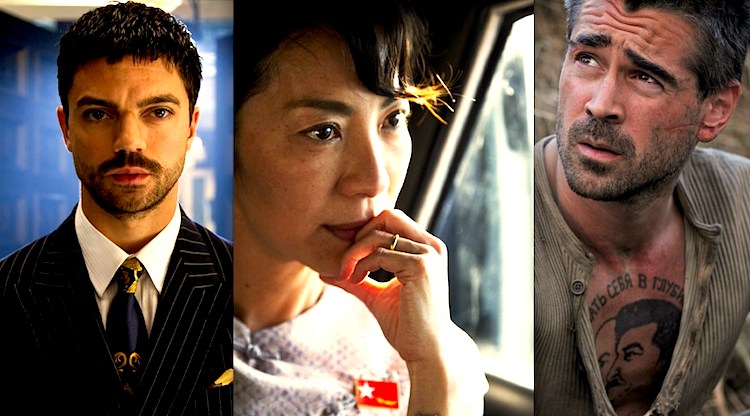
[Editor’s Note: this post appears today on the front page of The Huffington Post. Jason is very pleased to now be blogging at The Huffington Post.]
By Govindini Murty & Jason Apuzzo. Freedom is one of the most important prerequisites of artistic excellence. 2011 was distinctive for producing a number of critically acclaimed films that celebrated the history of the arts and of the cinema itself – from Martin Scorsese’s Hugo and Michel Hazanavicius’ The Artist, to Werner Herzog’s Cave of Forgotten Dreams and Woody Allen’s Midnight in Paris. Yet filmmaking never takes place in a vacuum, and these superb, literate films – which value knowledge, humanity, and civilization – are nonetheless the outgrowth of a free society, and would have had difficulty being made under circumstances of political tyranny.
It’s therefore worthwhile to celebrate the notable movies of 2011 that took the risk of advocating for democratic freedom, the political principle that makes so much film artistry possible. Some of these are foreign films created under the most difficult circumstances, while others are mainstream Hollywood productions made within the freedom of democratic society. Whether spectacular or intimate, tragic or comic, these films dramatized to audiences around the world the importance of liberty. With the revolutions of the Arab Spring, citizen protests in China, and the recent democracy demonstrations in Russia, 2011 was a remarkable year for democratic action and this year’s pro-freedom films often reflected this.
Given that many of these are foreign or independent films with multi-year releases, we thought it fair to include films that had their first theatrical or DVD release in the U.S. in 2011, or that screened in a U.S. film festival in 2011. Also, this is merely a list – not a ranking – so please consider each film on this list to have its own unique value.
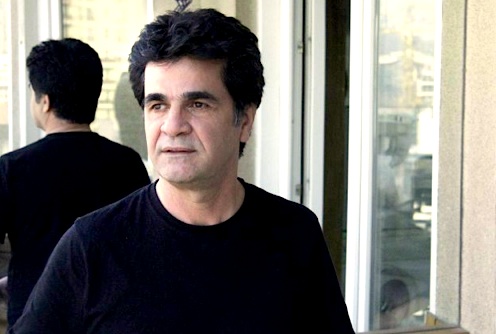
1. This is Not a Film – Jafar Panahi and Mojtaba Mirtahmasb, Iran
This is Not a Film depicts in heartbreaking detail the house arrest of acclaimed Iranian filmmaker Jafar Panahi, who was accused in 2010 of making a film critical of the Iranian government. Panahi vehemently denies the charges, yet he currently faces six years in jail and a twenty-year ban on filmmaking. Nonetheless, in This is Not a Film Panahi not only documents his own house arrest, revealing how the banal details of daily confinement can crush the human spirit; he also reveals how the creative impulse can survive even the most repressive circumstances, and inspire hope.
2. The Way Back – Peter Weir, U.S.
Starring Ed Harris, Colin Farrell, Jim Sturgess, and Saoirse Ronan and directed by Peter Weir, this epic and moving film based on real events tells the story of a group of Polish, American, and Russian political prisoners who escaped from a brutal Soviet gulag in 1941 and walked 4000 miles from Siberia to India and freedom. An extraordinary paean to liberty, The Way Back‘s courageous protagonists repeatedly affirm their willingness to die in freedom rather than live out their lives in the slavery of Soviet communism. The film’s concluding montage depicting the events of the Cold War is a long overdue acknowledgment from Hollywood of how the fall of European communism freed millions of Poles, Czechs, Russians, and Eastern Europeans.
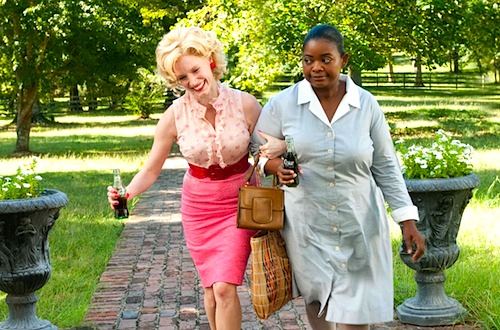
3. The Help – Tate Taylor, U.S.
The civil rights drama The Help reveals how the struggle for freedom is equally urgent when it comes to racial equality in America. With gripping performances from Viola Davis, Octavia Spencer and a powerful ensemble cast, The Help portrays the plight of African-American women who labored as house maids in the American South of the 1960s. The Help depicts the daily humiliations and injustices that grind down the human spirit and that form an ‘internal prison’ of despair that can be as destructive as any war, or act of violence. Taking place within recognizable domestic circumstances, The Help shows that our respect for civil rights in America is as important as our fight for human rights around the world.
4. Petition – Zhao Liang, China
A member of the ‘Digital Generation’ of independent Chinese documentarians, Zhao Liang depicts in Petition the Kafkaesque struggle of the Chinese people for justice from their own government. Petition follows real citizens, often poor and powerless, who travel from all across China to Beijing to petition the government for redress against local injustices. Zhao Liang goes into the petitioners’ shanty towns to hear their tragic tales of official malfeasance: unlawful imprisonment, confiscations of property, torture and death at the hands of local authorities. The petitioners wait months and sometimes years for their cases to be heard, and in the meantime eke out miserable existences in cardboard hovels on the sidewalks of Beijing. Following on Zhao Liang’s powerful Crime and Punishment, Petition is essential viewing for anyone who wishes to understand the abysmal state of human rights in communist China.
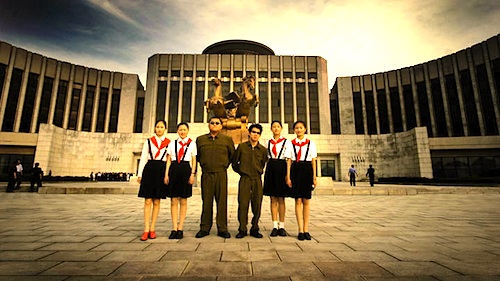
5. The Red Chapel – Mads Brügger, Denmark
In one of the bravest films in recent memory, director Mads Brügger and Danish-Korean comedians Simon Jul Jørgensen and Jacob Nossell risk their lives traveling to North Korea to tweak/punk that nation’s tyrannical communist regime. Ostensibly visiting North Korea for the purpose of putting on a Danish socialist comedy show as an ‘inter-cultural exchange,’ the filmmakers’ true purpose is to document the censorship and inhumanity of the North Korean government. Referring to the communist dictatorship as “the most heartless and brutal totalitarian state ever created,” Brügger and his comedians repeatedly make fools of the authorities in this blackly satirical, poignant and insightful documentary. All the more relevant after the demise of Kim Jong Il, The Red Chapel follows on the heels of North Korea-themed films like Kimjongilia, Yodok Stories, and The Juche Idea in illustrating how the cinema can advocate for freedom by exposing tyranny.
6. Transformers: Dark of the Moon – Michael Bay, U.S.
Big summer popcorn movies are still some of the most effective (and entertaining) ways to convey the importance of fighting for freedom, as Michael Bay’s epic Transformers films have proven time and again. With a plot spanning the Cold War and America’s space race with Russia, this third film in the Transformers series features Decepticon robots scheming to enslave Earth – before Sam Witwicky (Shia LaBeouf), his loyal Autobot friends, and the U.S. military come to the rescue. Much like Bay’s previous films, Dark of the Moon mixes spectacular action (here in breathtaking 3D) and cheeky humor with a celebration of America’s independent streak, fighting spirit, and passion for freedom. As Autobot leader Optimus Prime puts it, while defending his human allies from alien invasion: “The day will never come that we forsake freedom.”
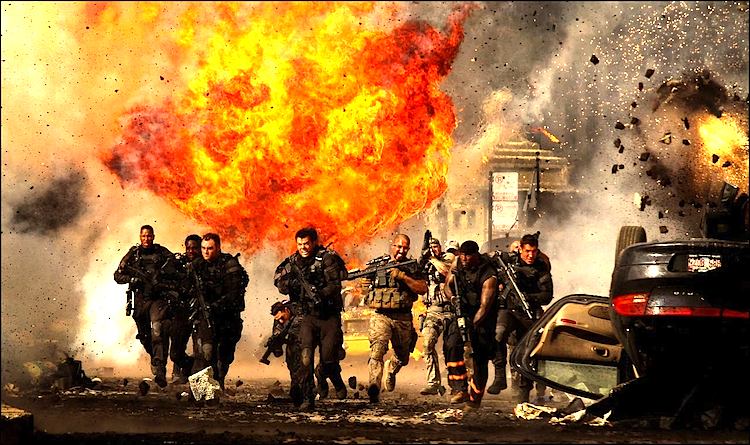
7. The Devil’s Double – Lee Tamahori, Belgium/Netherlands
Starring Dominic Cooper in a career-making dual performance, The Devil’s Double tells the true story of Saddam Hussein’s villainous son Uday and his reluctant body double, Latif Yahia. Stylishly filmed by former James Bond director Lee Tamahori (Die Another Day), The Devil’s Double depicts the full tyranny of the Hussein family’s mafia-like reign in the ’80s and ’90s, dramatizing the plight of average Iraqis under their cruel and arbitrary rule. While taking not taking an overt position on the Iraq War, the film nonetheless depicts a brutal and ultimately doomed dictatorship that was a menace to the region – and to the human rights of the Iraqi people.
8. The Lady – Luc Besson, United Kingdom/France
Burmese democracy activist and Nobel Peace Prize winner Aung San Suu Kyi has lived an extraordinary life, seemingly tailor-made for the big screen. The Lady tells the story of Aung San Suu Kyi’s (Michelle Yeoh) multi-decade struggle for democracy in Burma, now renamed Myanmar by its ruling military junta. The film depicts the poignancy of Suu Kyi’s struggle: leaving her happy marriage and family in England, she returns to her homeland of Burma to lead the struggle for democracy, with the party she founded (the National League for Democracy) ultimately winning the 1990 elections. The election results are invalidated, however, and Suu Kyi is placed under house arrest for much of the next twenty years. Besson depicts the tremendous sacrifices made by Aung San Suu Kyi as a wife and mother for the cause of Burmese freedom.
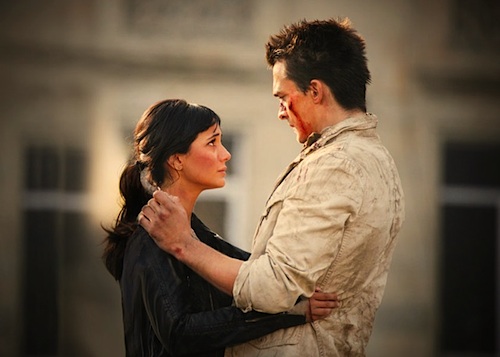
9. 5 Days of War – Renny Harlin, U.S.
Director Renny Harlin’s 5 Days of War is two things simultaneously: a crisp, high-octane action-war drama, and a heart-rending depiction of the brutal Russian invasion of Georgia in 2008. While largely side-stepping the initial cause of the invasion, 5 Days lingers on the human toll of the Russian assault, and on the courageous war reporters who struggled to get the story of war crimes out to the world. Featuring American stars like Val Kilmer, Andy Garcia, Dean Cain and Heather Graham, the film is as much an indictment of international indifference to human suffering as it is of the actual invasion. A stirring, emotional film that celebrates Georgia’s desire for freedom, 5 Days concludes with a moving postscript featuring real-life victims of the invasion describing atrocities committed against their families.
10. Battle: Los Angeles – Jonathan Liebesman, U.S.
American science fiction has always taken a keen interest in the struggle for freedom. An intense, stirring and patriotic ode to America’s fighting men and women, Battle: Los Angeles depicts a team of Marines – led by Aaron Eckhart as a rugged Marine staff sergeant – tasked with defending Los Angeles from a massive alien assault. Like an old-school World War II film, Battle: Los Angeles revels in the honor of military service, the basic code of fidelity to the mission and one’s fellow soldier – especially in the face of overwhelming odds. Against a backdrop of intense urban warfare, often resembling street fighting in Iraq, director Jonathan Liebesman captures the steadiness and quiet resolve of America’s soldiers as they defend civilians in an apocalyptic battle for human liberty.

We’d like to thank our colleague Joe Bendel for helping us compile this list and for his work reviewing many of these films for Libertas Film Magazine. Other timely films from 2011 on the subject of freedom include: Khodorkovsky, the chilling account of the Russian mogul’s imprisonment by Putin; Cairo 6, 7, 8 and Scheherazade, Tell Me a Story, both portraying the struggle for women’s rights in modern Egypt; along with The Black Tulip and The Miscreants of Taliwood, about the efforts of average Afghans to resist Taliban rule.
Posted on December 31st, 2011 at 8:32am.
That’s a wonderful list, Jason and Govindini — I can’t wait to see the films I missed.
Regarding “The Way Back,” I’d add that the opening of the film, which showed the Communists attacking the man through his wife was especially deft because it showed the very essence of the movement, and provided a powerful — and true — inspiration for the story.
I also LOVE Collin Ferrel’s line when he broke away from the group: “Freedom … what would I do with it?” That’s perfect … in that system …. criminals would be the only ones thriving.
The Transformers addition is also perfect.
I’d consider adding “Machine Gun Preacher” and “There Be Dragons.” A special little nod has to go to “Farewell” and “Carlos” — both only came out on home video in the States, but nonetheless important to truth and freedom.
Happy New Year, guys!
Many thanks, Vince! And a Happy New Year to you, as well!
Great list… I cannot wait to track down The Red Chapel. Thanks!
Cool … thanks for the shout-out.
Nice list, for the most part, I especially enjoyed The Way Back, Battle: Los Angeles, and The Help. As for Transformers 3…we will have to agree to disagree. I think instead of “cheeky humor”, “2 hours of terribly unfunny comic filler” would be better. Those action scenes were spectacular, however.
Given your admiration of Spielberg, I am surprised there have been no reviews of Tintin (which I loved, I enjoyed the comics as well) or War Horse (not bad). What did you think of them? What about Mission Impossible 4? I just got back from viewing that, not too bad, but the villian was basically a nonentity, unfortunately.
Anyway, thanks for all the great work on the website this year. Good luck in 2012!
Sean, thanks so much for your comments, I appreciate it.
We’ve been a bit light on reviews lately due to non-Libertas commitments. I haven’t had the chance, alas, to see either of Spielberg’s new films, but I did see MI4 and loved it. I agree with you that the villain was dull, but the action (especially in IMAX) was spectacular – some of the best I’ve seen in a spy film in years – and Brad Bird really did import the colorful, imaginative Pixar style into the live action. The film was a lot of fun, and really put the recent Bond films to shame.
I’m sorry you didn’t like Transformers, but I did think it deserved to be on the list due to the film’s themes. I would’ve liked, for example, for MI4 to have been on the list, but the film didn’t really have enough to say about the world we live in; it was more an exercise in style, albeit an enjoyable one.
Good to see you guys are having success in other endeavors, but I also miss your posts here on Libertas, from your reviews to your Alien Invasion and Sword & Sandal reports, etc. This is truly an informative, witty and enjoyable website to read, and I hope to see it continue in the future as long as possible (and it’s head and shoulders above That Other Site, with all the hacks, dweebs and posers that post the same whiny BS over and over again…)
Keep up the good work, and best of luck in 2012!
Nick, I can’t thank you enough for your very kind words. Doing Libertas is a great pleasure for us all, and we’re so glad that you and other readers have responded to this site so positively. We brought this site back in its current form because we felt there was a need for it, in so far as exploring the theme of freedom in contemporary cinema was not being done in any serious or systematic way on the internet. Given our resources, I’m very proud of our efforts – although there’s still so much more I wish we could do here.
Currently I’m occupied with another commitment outside of blogging that is limiting the time I can spend writing either here or at HuffPost. We’ll try to compensate for my temporary absence in various ways, one of which will likely involve my writing fewer but more impactful posts. I’ll keep everybody updated.
I was able to catch The Way Back on Netflix and found it to be the most moving film that I’ve seen in a long time. It’s my best picture of 2011.
Very interesting. Now over to HuffPo to read the comments over there. This should be interesting…..
Less vitriol than I expected, good.
Thanks for keeping an eye on us! I appreciate it.
I’m just starting to get the feel of interacting with the commenters over there. Needless to say, it’s quite a bit different. 😉
I too recently saw MI-4 and loved it. However, i am surprised the film is doing well here AND overseas(sarcastically) because
A)The heroes are brave, selfless, loyal, highly skilled AMERICAN (NOT UNITED NATIONS) covert operatives who risk it all to save the world from an insane foreign terrorist (not jihadist, but not “right-wing neo-nazi” like The Sum of All Fears or evil capitalist) who is determined to instigate world wide nuclear holocaust.
B)The Russians, while not the enemy, are portrayed as hot headed shoot first ask question later types, and whose own actions bring about tragic results as well.
C) AND INTERESTINGLY ENOUGH= The only American who comes off bad is The American President, (who at this time is Obama). In this film we are outright told that he is quick to throw our heroes under the bus for the sake of politics. He makes no attempt to discover the real culprit in the film in order to stop his plans. Instead, he is content to simply disavowe an ENTIRE agency (IMF) dedicated to protecting the American People (thus forcing its members to go underground) and specifically label our heroes as “terrorists” and treating them as such if they ever step foot on US soil.(straight out of the Janet Napolitano playbook = the enemy is our military/covert operatives, NOT TERORISTS)
? I THOUHT THESE FILMS DO NOT PLAY WELL IN THE UNITED STATES OR OVERSEAS? AT LEAST THAT IS WHAT THE LIBERAL ELITES IN HOLLYWOOD CLAIM.
All good points, Omar. I would add, however, that the film did contain one line – I believe uttered by the Russian arms merchant – about “all potential terrorists being terrorists” in America’s eyes. Cruise’s character made no effort to challenge that point, to my disappointment. With that said, I did notice those aspects of the film that you mention, and they certainly enhanced my enjoyment of the film even more. On balance I found the film relatively apolitical, and action-oriented, which is fine by me these days.
My favorite movie of the year was “Moneyball”, off the top of my head can’t think of much else I saw that seemed really top notch (just saw “The Descendants”, I’m thinking Payne is quite overrated as a director). I had wanted to see “The Way Back” based on your original review, but never made it, perhaps on DVD later this year.
Congratulations on the Huffington Post gig, I think, I thought they were all slightly crazy over there, but maybe I’m wrong on that one.
Thanks for your thoughts, Patrick. If you have Netflix, by the way, I believe The Way Back is available for streaming there. Otherwise, I’m having a great time over at HuffPost so far; the comment section is certainly pretty lively over there …
Great tips for rentals…I found Red Chapel at Netflix, BTW.
Jason,
Just came back from checking out your HuffPo column. And the comments. Actually I think we need to use another word to describe what I was reading, the stuff following your article wasn’t “comments” as I understand the word. Short or long rambling passages of polemic diatribe that if you could hear it read by the writer would be loud, fast, all running together in well practiced and memorized rants. On a soapbox, natch.
Very surprising to learn that Latin America needs to be liberated from the dominion of the USA, do you think they know?
I was going to “FAN” you but it seems that membership in Facebook is required. I don’t facebook, sorry. I noticed that every party-member, sorry, commenter, had a social media score pasted under their user name. Again, sorry. I’m very friendly, but I’m not social. Not in the way the term is used today. Interesting difference, the quality of the post isn’t important compared to the social acceptability of the poster.
So if you can let us know if you post anything on HuffPo that doesn’t get posted here, otherwise, I will be keeping out of that neighborhood.
John, thanks so much and I’ll accept your comment as a ‘virtual fanning,’ although that somehow sounds vulgar. 😉 Anyway, it’s funny that you mention all this because the whole social networking side of blogging completely mystifies me. I view the internet as a wonderful medium for articles, essays, blog posts, etc. – but this arcane side world of Twitter, Facebook, ‘fanning,’ ‘faving,’ ‘liking,’ et al, is truly dizzying … it’s like having to learn spells at Hogwarts, or speaking the right words after rubbing Aladdin’s Lamp. I basically just try to write the best pieces I can, and then interact whenever possible with folks in the comments section, here or elsewhere – provided they meet a certain threshold of sanity – and leave it at that. Whether I’m ‘faved’ or ‘liked’ will, I assume, work itself out over time … and maybe get me a discount at Amazon, or something.
Frankly, I relish the opportunity to interact with the HuffPost commenters because I enjoy the challenges they pose to my way of thinking. Some of those challengers are admittedly more strenuous than others, but so far it hasn’t been dull. In any case, we’ll continue to post our HuffPost pieces here, which I love doing anyway because we can cut loose visually (in terms of the pictures). And thanks again for your readership.